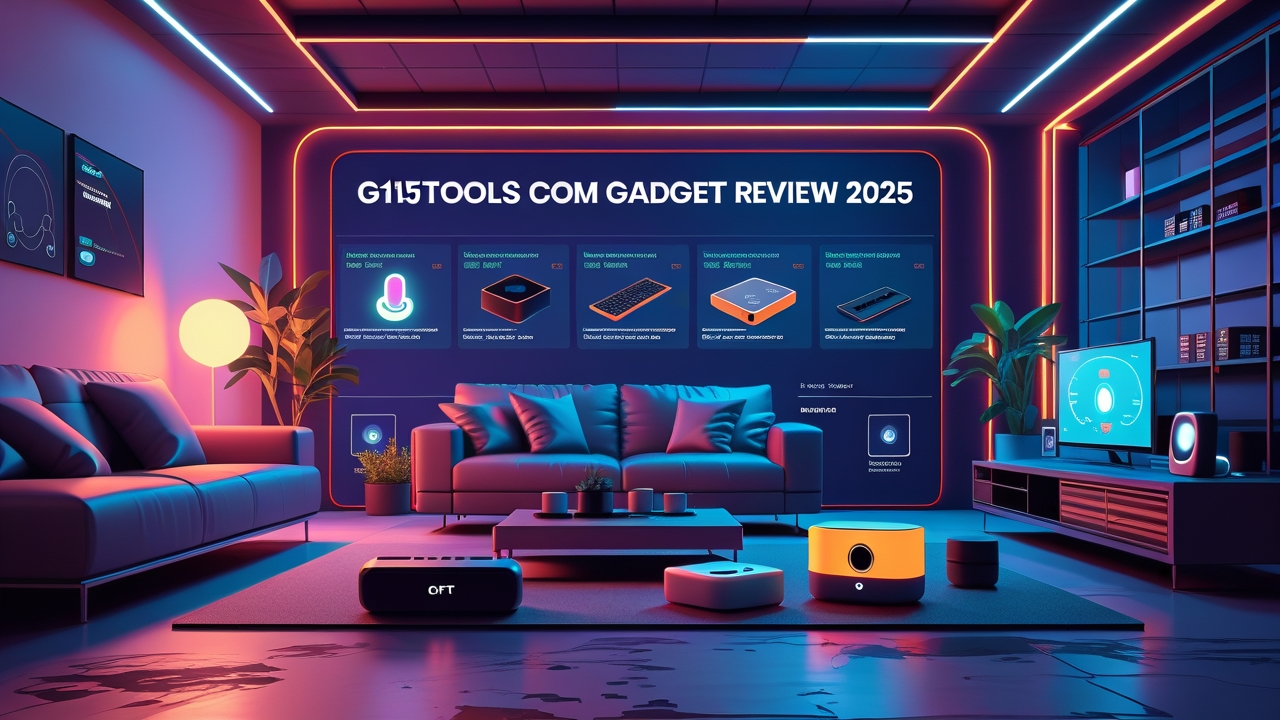G15Tools.com has emerged as a prominent destination for tech enthusiasts seeking comprehensive gadget reviews and cutting-edge technology insights. As we dive into 2025, this platform continues to evolve, offering users an extensive collection of smart home devices, gaming accessories, and innovative tech solutions without requiring account registration or complex navigation.
Table of Contents
Key Takeaways
- G15Tools.com provides accessible, no-login-required gadget reviews covering gaming peripherals, smart home technology, and wearable devices
- The platform has experienced significant growth with 185% traffic increase, attracting users primarily from France, the US, and India
- User-friendly interface and mobile-responsive design make it suitable for both tech professionals and casual consumers
- Comprehensive testing methodology includes build quality assessment, real-world performance evaluation, and value-for-money analysis
- While offering extensive product coverage, the platform lacks community features and author transparency
What is G15Tools.com Gadget Platform?
G15Tools.com operates as a comprehensive tech gadget hub designed to bridge the gap between complex technical specifications and practical user needs. The platform serves as a centralized resource for consumers navigating the increasingly crowded landscape of smart technology, offering detailed insights into product performance without overwhelming users with unnecessary jargon.
The platform distinguishes itself through its commitment to accessibility. Users can immediately access reviews, comparisons, and technical analysis without creating accounts or navigating through subscription barriers. This approach reflects a growing trend toward friction-free content consumption, particularly important for users seeking quick product information during their purchasing journey.
Core Platform Features
The website’s architecture prioritizes user experience through clean, intuitive design elements. Navigation remains straightforward, with logical category divisions that allow users to quickly locate specific product types. The mobile-responsive framework ensures consistent functionality across devices, recognizing that many users access product reviews while shopping in physical stores or during commutes.
Search functionality operates efficiently, returning relevant results based on product categories, brand names, or specific features. This streamlined approach reduces the time users spend hunting for information, addressing a common frustration with more complex review platforms.
Content Categories Covered
G15Tools.com spans multiple technology sectors, from gaming peripherals and smart home automation to wearable fitness trackers and productivity software. Each category receives regular attention, with reviews covering both budget-friendly options and premium products. The platform recognizes that different users have varying needs and price points, attempting to provide valuable insights regardless of budget constraints.
Gaming accessories receive particular attention, reflecting the substantial market for PC and console peripherals. Coverage includes mechanical keyboards, gaming mice, headsets, and specialized controllers. Smart home devices represent another major focus area, encompassing voice assistants, automated lighting systems, security cameras, and climate control solutions.
Detailed Review of G15Tools.com Gadgets
The review methodology employed by G15Tools.com combines technical analysis with practical usage scenarios. Each product undergoes multiple evaluation phases, beginning with unboxing and initial setup, progressing through extended usage periods, and concluding with long-term durability assessments.
Popular Gadget Categories
Smart speakers and voice assistants receive comprehensive coverage, with reviews examining audio quality, voice recognition accuracy, and integration capabilities with existing smart home ecosystems. The platform tests these devices in various environments, from quiet home offices to busy family kitchens, providing realistic performance expectations.
Gaming peripherals represent another strength, with detailed analysis of response times, build quality, and ergonomic design. Reviews consider different gaming genres and user preferences, recognizing that a mouse optimized for first-person shooters may not suit strategy game enthusiasts. Keyboard reviews examine switch types, key feel, and programmability options.
Portable power banks and charging solutions receive thorough testing, including capacity verification, charging speed analysis, and compatibility assessment with various devices. Given the critical role these accessories play in daily technology use, reviews emphasize reliability and safety features alongside performance metrics.
Testing and Review Process
Build quality assessment forms the foundation of every review, examining materials, construction methods, and overall durability. This process includes stress testing where appropriate, such as drop tests for portable devices or extended usage cycles for mechanical components.
Real-world performance testing moves beyond manufacturer specifications to evaluate actual user experience. For audio devices, this includes testing in various acoustic environments. For smart home products, integration testing with popular platforms like Amazon Alexa, Google Assistant, and Apple HomeKit provides practical compatibility information.
Value-for-money analysis considers not just initial purchase price but also long-term ownership costs, warranty coverage, and available customer support. This holistic approach helps users make informed decisions based on total cost of ownership rather than just upfront expenses.
Key Features That Make G15Tools Stand Out
The platform’s commitment to accessibility extends beyond simple navigation to encompass content presentation and technical communication. Reviews avoid unnecessary jargon while maintaining technical accuracy, making complex specifications understandable for general consumers without sacrificing depth for technology professionals.
Accessibility and Ease of Use
The no-registration-required policy removes barriers that often prevent users from accessing content on competing platforms. This approach recognizes that many users seek quick information during active shopping sessions and don’t want to commit to creating yet another online account.
Content organization follows logical hierarchies, with clear product categories and subcategories that match how consumers typically shop for technology products. Search results display relevant information prominently, reducing the need to click through multiple pages to find basic specifications or pricing information.
Mobile compatibility extends beyond responsive design to consider how users interact with content on smaller screens. Review sections are structured to provide key information quickly, with detailed technical specifications organized in easily scannable formats.
Content Quality and Updates
Regular content updates ensure that product information remains current, particularly important in the fast-moving technology sector where firmware updates, price changes, and availability shifts occur frequently. The platform attempts to maintain accuracy across its product database, though this presents ongoing challenges given the volume of products covered.
Coverage of current tech trends helps users understand how individual products fit into broader technology ecosystems. For example, smart home device reviews consider integration capabilities with emerging standards and protocols, helping users make future-proof purchasing decisions.
User Experience and Performance Analysis
Website performance metrics indicate strong user engagement, with traffic analysis showing consistent growth patterns. The 185% traffic increase demonstrates growing user trust and search engine recognition, while geographic distribution reveals international appeal beyond initial target markets.
Website Usability
Site loading speed meets contemporary user expectations, with pages rendering quickly even when including multiple product images and comparison charts. This performance level becomes particularly important for mobile users who may have limited bandwidth or older devices.
Navigation efficiency allows users to move between related products and categories without losing their place or starting searches over. Breadcrumb navigation and related product suggestions help users discover relevant alternatives they might not have initially considered.
Customer Feedback and Reviews
While the platform doesn’t currently offer community features like user comments or ratings, it does incorporate user feedback into content updates and product selection. This behind-the-scenes approach to community input helps maintain content quality while avoiding some of the moderation challenges that plague platforms with open comment systems.
User testimonials and case studies appear throughout reviews, providing real-world context for technical specifications and performance claims. These elements help bridge the gap between laboratory testing results and actual user experience in diverse environments and use cases.
Pros and Cons of G15Tools.com Gadgets
Advantages
The platform’s broad product range covers most major technology categories that consumers actively research, from basic accessories to complex smart home systems. This comprehensive approach allows users to find information about related products in one location, streamlining the research process.
Affordable pricing focus ensures that reviews include budget-conscious options alongside premium products. This inclusive approach recognizes that not all users have unlimited budgets and that value can be found across price ranges with careful selection.
Quality assurance processes help filter out products with known issues or poor long-term reliability. While the platform cannot test every product indefinitely, the structured evaluation process identifies obvious problems that might not be apparent in shorter review periods used by some competing sites.
The user-friendly design philosophy prioritizes information accessibility over complex features that might confuse casual users. This approach makes the platform valuable for users who want reliable product information without navigating learning curves associated with more feature-rich platforms.
Limitations
Limited author transparency makes it difficult for users to assess reviewer expertise or potential conflicts of interest. While this approach maintains focus on content rather than personalities, it may reduce credibility for users who prefer knowing reviewer backgrounds and qualifications.
The absence of community features eliminates opportunities for users to share experiences, ask questions, or provide updates about long-term product performance. This limitation becomes particularly noticeable for complex products where user experiences vary significantly based on specific use cases or configurations.
Occasional formatting inconsistencies suggest that content production may involve multiple contributors with varying style guidelines. While these issues don’t typically affect information accuracy, they can impact the professional appearance and user experience.
Traffic Analysis and Market Performance
Current traffic metrics indicate strong market position, with 7.97K monthly visits representing substantial engagement for a specialized technology review platform. The 185% growth rate suggests effective SEO strategies and growing user awareness, though sustaining this growth will require continued content expansion and quality maintenance.
Geographic distribution reveals interesting market patterns, with French users representing 42% of traffic, followed by US users at 24% and Indian users at 7%. This distribution suggests either targeted marketing efforts in these regions or organic discovery patterns that favor these geographic areas.
Keyword performance analysis indicates strong organic search presence for gadget-related terms, though opportunities exist for expansion into emerging technology categories and long-tail keyword optimization. The platform appears well-positioned to capitalize on growing search volume for smart home and gaming peripheral reviews.
How G15Tools Compares to Competitors
Compared to larger technology review platforms, G15Tools.com offers more focused coverage without the overwhelming amount of content that can make navigation difficult on sites covering broader technology topics. This specialization allows for deeper coverage of specific product categories while maintaining manageable site structure.
The no-registration approach differentiates the platform from competitors requiring account creation for full access to reviews and comparisons. This accessibility advantage becomes particularly valuable for mobile users and those seeking quick product information during shopping trips.
Content depth generally exceeds what users find in brief product listings on e-commerce sites, while remaining more accessible than highly technical reviews targeting professional audiences. This positioning serves the substantial middle market of informed consumers who want thorough information presented in understandable formats.
Future Outlook and Improvements for 2025
The platform appears positioned for continued growth, with opportunities for expansion into emerging technology categories like virtual reality accessories, electric vehicle charging solutions, and advanced wearable health monitors. These areas represent growing consumer interest with relatively limited specialized coverage from existing review platforms.
AI integration possibilities could enhance user experience through improved search functionality, personalized product recommendations, and automated content updates for pricing and availability changes. However, implementation would need to maintain the platform’s current focus on accessibility and straightforward navigation.
Community building initiatives could add value without necessarily requiring full comment systems, such as user polls, preference surveys, or simplified feedback mechanisms that help guide content priorities and product selection for future reviews.





